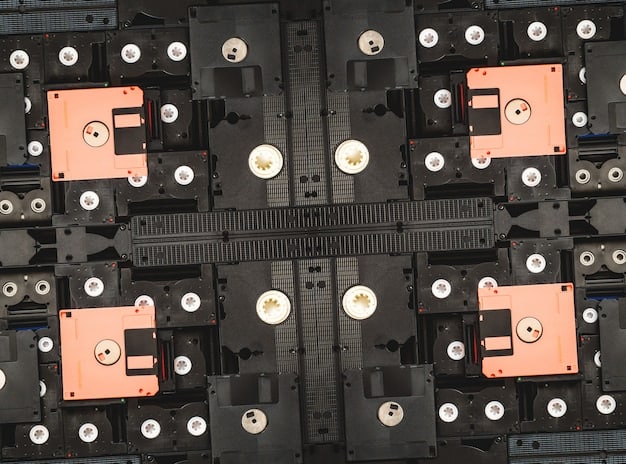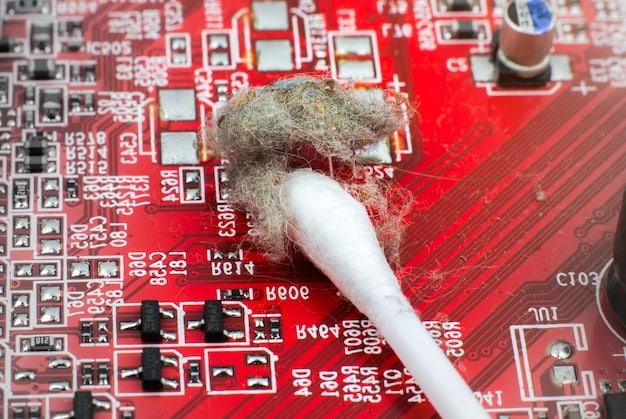Console Modding in 2025: Navigating Risks, Rewards & Legality in the US

Console modding in 2025 involves navigating a complex landscape of potential benefits like enhanced gameplay and customization, weighed against risks such as voided warranties, legal repercussions, and the ethics of copyright infringement in the US.
The world of console gaming is constantly evolving, and as we look ahead to 2025, the practice of console modding in 2025: Risks, Rewards, and Legal Considerations in the US continues to be a topic of debate. This article dives into the risks, rewards, and legalities of console modding in the US, providing a comprehensive overview for gamers considering this path.
Understanding Console Modding in 2025
As technology advances, so do the methods and motivations behind console modding. Before diving into the specifics, it’s important to establish a clear understanding of what console modding entails and why individuals choose to engage in it.
Console modding involves altering the hardware or software of a gaming console to achieve functionalities beyond its original design. This can range from cosmetic changes to significant performance enhancements.
What Constitutes Console Modding?
Console modding encompasses a wide array of activities, each with varying degrees of complexity and risk. Understanding these different types can help gamers make informed decisions about their approach.
- Hardware Modifications: These involve physical alterations to the console, such as adding custom cooling solutions, replacing internal components, or installing mod chips.
- Software Modifications: This includes modifying the console’s operating system or game software to enable features like custom firmware, homebrew applications, or cheat codes.
- Cosmetic Modifications: These are purely aesthetic changes, like custom paint jobs, LED installations, or custom enclosures.
Why People Mod Consoles
The reasons for modding consoles are diverse, reflecting the varied interests and needs of the gaming community. Some seek enhanced performance, while others are driven by the desire for personalization or expanded functionality.
- Enhanced Performance: Modding can improve a console’s processing power, memory, or cooling capabilities, resulting in smoother gameplay and higher frame rates.
- Customization and Personalization: Many modders enjoy customizing their consoles to reflect their personal style, whether through unique paint jobs or custom software features.
- Access to Homebrew and Unsigned Code: Modding allows users to run homebrew games, emulators, and other unsigned code, opening up a world of possibilities beyond the console’s original software library.
Ultimately, console modding in 2025 is driven by a desire to push the boundaries of what’s possible with gaming consoles, whether for performance gains, aesthetic customization, or expanded functionality.
The Potential Rewards of Console Modding
While console modding comes with its share of risks, the potential rewards can be substantial for those willing to take the plunge. These rewards span improved performance, enhanced customization, and access to a broader range of gaming experiences.
One of the primary attractions of console modding is the ability to enhance the console’s performance beyond its factory settings. This can lead to noticeable improvements in gameplay.

Boosting Performance
Modders often focus on improving aspects like frame rates, resolution, and loading times to deliver a smoother, more immersive gaming experience. Achieving these enhancements requires careful planning and execution.
Improved Performance and Visuals. Modding allows for overclocking the console’s processor and graphics card, which can result in higher frame rates and better graphics. Also improved Loading Times
- Overclocking: Increasing the clock speed of the CPU and GPU can significantly boost performance, although it also increases the risk of overheating.
- Memory Upgrades: Adding more RAM can improve loading times and reduce stuttering, especially in graphically demanding games.
- Cooling Solutions: Upgrading the console’s cooling system with aftermarket fans or liquid cooling can help maintain stable performance during overclocking.
Unlocking Customization Options
Beyond performance, console modding offers unparalleled opportunities for customization. Modders can personalize their consoles to reflect their unique tastes and preferences, creating a truly one-of-a-kind gaming experience.
Cosmetic Modifications: Customizing the console’s appearance with paint jobs, decals, and lighting effects. Software Customization: Modifying the console’s operating system to change the user interface, add new features, or install custom themes.
- Custom Paint Jobs: Applying custom paint schemes or artwork to the console’s exterior can make it stand out from the crowd.
- LED Installations: Adding LED lighting effects can create a visually stunning look, with options for customizable colors and patterns.
- Custom Enclosures: Replacing the console’s stock case with a custom-designed enclosure can completely transform its appearance.
In summary, console modding in 2025 offers a range of compelling rewards, from enhanced performance and customization to access to a wider range of gaming experiences. However, it’s essential to weigh these rewards against the potential risks before embarking on a modding project.
The Risks and Drawbacks of Console Modding
Despite the allure of enhanced performance and customization, console modding is not without its risks and drawbacks. Understanding these potential pitfalls is crucial for making informed decisions and avoiding costly mistakes.
One of the most significant risks associated with console modding is the potential to void the manufacturer’s warranty. This can leave modders without recourse if something goes wrong during the modding process or afterward.

Voiding Warranties
Most console manufacturers explicitly state that any unauthorized modifications will void the warranty. This means that if the console malfunctions due to the modding process, the manufacturer is not obligated to provide repairs or replacements.
Physical Damage: Incorrect modding techniques can lead to physical damage to the console’s components. Software Instability: Installing custom firmware or software can cause system instability, leading to crashes, freezes, or data loss.
- Physical Damage: Incorrectly installing hardware modifications can damage delicate components, rendering the console unusable.
- Software Instability: Installing custom firmware or software can introduce bugs or conflicts, leading to system crashes and data loss.
- Ban Risks: Many online gaming services prohibit the use of modded consoles, and users who violate these terms risk having their accounts banned.
Legal and Ethical Considerations
Beyond the technical risks, console modding also raises important legal and ethical questions. Modders must be aware of copyright laws, licensing agreements, and the potential impact of their actions on the gaming industry.
Copyright Infringement: Downloading and playing pirated games on modded consoles is a violation of copyright law. Circumvention of DRM: Modding consoles to bypass DRM (Digital Rights Management) measures can also be illegal.
- Copyright Infringement: Modding consoles to play pirated games or distribute copyrighted content is illegal and can result in legal penalties.
- Circumvention of DRM: Modding consoles to bypass DRM (Digital Rights Management) measures can violate copyright laws, as DRM is designed to protect intellectual property.
- Licensing Agreements: Modding consoles may violate the terms of service or licensing agreements with game developers and publishers, leading to account bans or legal action.
In conclusion, console modding in 2025 presents a complex set of risks and drawbacks that must be carefully considered. While the potential rewards may be tempting, modders must be aware of the potential consequences, including voided warranties, hardware damage, legal liabilities, and ethical concerns.
The Legal Landscape of Console Modding in the US
The legality of console modding in the US is a murky area, governed by a complex interplay of copyright laws, licensing agreements, and court precedents. Understanding this legal landscape is essential for modders who want to avoid running afoul of the law.
At the heart of the legal debate is the Digital Millennium Copyright Act (DMCA), which prohibits the circumvention of technological measures designed to protect copyrighted works. This has significant implications for console modding.
DMCA and Circumvention: The DMCA makes it illegal to circumvent technological protection measures that control access to copyrighted works, including video games. Fair Use Exceptions: The DMCA includes exceptions for fair use, which may allow for certain types of modding activities for purposes such as education, research, or criticism
Key Legal Considerations
Several key legal considerations come into play when assessing the legality of console modding activities. These include the purpose of the mod, the extent of the modification, and the impact on the copyright holder’s rights.
- Purpose of the Mod: Modding for personal use, such as enhancing performance or customizing the console’s appearance, is generally viewed differently than modding for commercial purposes, such as distributing pirated games.
- Extent of the Modification: Modifying the console’s hardware or software in a way that bypasses DRM or infringes on copyright is more likely to be considered illegal than making purely cosmetic changes.
- Impact on Copyright Holder’s Rights: Modding activities that significantly harm the copyright holder’s ability to profit from their work, such as enabling piracy, are more likely to be subject to legal action.
Case Law and Legal Precedents
While there are few specific court cases directly addressing console modding, existing case law and legal precedents can provide some guidance. These cases often involve similar issues, such as the circumvention of DRM or the infringement of copyright.
DMCA Lawsuits: Cases involving the DMCA have established legal precedents regarding the circumvention of technological protection measures. Copyright Infringement Cases: Court decisions in copyright infringement cases have clarified the rights of copyright holders and the responsibilities of those who use their works.
- DMCA Lawsuits: Cases involving the DMCA have established legal precedents regarding the circumvention of technological protection measures, which can be relevant to console modding activities.
- Copyright Infringement Cases: Court decisions in copyright infringement cases have clarified the rights of copyright holders and the responsibilities of those who use their works, including modders who distribute or play pirated games.
- Fair Use Doctrine: The fair use doctrine provides a legal defense for certain uses of copyrighted works, such as criticism, commentary, news reporting, teaching, scholarship, and research, but its applicability to console modding is limited.
In conclusion, the legal landscape of console modding in the US is complex and uncertain. Modders must be aware of the laws and regulations that govern their activities, and they should seek legal advice if they are unsure about the legality of a particular modification.
Ethical Considerations in Console Modding
Beyond the legal ramifications, console modding raises important ethical considerations. Modders must weigh the potential benefits of their activities against the potential harm to game developers, publishers, and the gaming community as a whole.
One of the central ethical questions is whether modding consoles to play pirated games is morally justifiable. While some modders argue that they are simply exercising their right to use their consoles as they see fit, others contend that piracy undermines the gaming industry and harms the creators of the games they enjoy.
Impact on Game Developers: Modding consoles to play pirated games reduces revenue for game developers, potentially hindering their ability to create new games. Community Standards: Modding activities should respect community standards and avoid promoting harmful or offensive content.
Respecting Intellectual Property Rights
A key ethical consideration is the respect for intellectual property rights. Modders should be mindful of copyright laws and avoid engaging in activities that infringe on the rights of game developers and publishers. One must understand the impact on game developers.
Piracy and Revenue Loss: Playing pirated games reduces revenue for game developers, which can affect their ability to develop new titles. DRM Circumvention: Bypassing DRM measures to play games without paying is a violation of intellectual property rights.
- Piracy and Revenue Loss: Playing pirated games reduces revenue for game developers, which can affect their ability to develop new titles.
- DRM Circumvention: Bypassing DRM measures to play games without paying is a violation of intellectual property rights and undermines the gaming industry’s efforts to protect its content.
- Fair Compensation for Creators: Supporting game developers by purchasing their games ensures that they are fairly compensated for their work and can continue to create innovative and engaging gaming experiences.
The Impact on the Gaming Community
Modding activities can also have a broader impact on the gaming community. Modders should consider how their actions might affect other players, the integrity of online gaming environments, and the overall reputation of the modding community.
Online Gaming Integrity: Using modded consoles to cheat or gain an unfair advantage in online games harms the experience for other players. Community Reputation: Responsible modding practices contribute to a positive perception of the modding community.
- Online Gaming Integrity: Using modded consoles to cheat or gain an unfair advantage in online games harms the experience for other players and undermines the integrity of online gaming environments.
- Community Reputation: Responsible modding practices, such as respecting copyright laws and avoiding harmful or offensive content, contribute to a positive perception of the modding community.
- Promoting Ethical Modding Practices: Encouraging ethical modding practices, such as sharing mods responsibly and respecting the rights of game developers, helps to foster a healthy and sustainable modding ecosystem.
In conclusion, ethical considerations are an integral part of console modding. Modders should strive to balance their desire for enhanced performance and customization with their responsibility to respect intellectual property rights, support the gaming industry, and contribute to a positive gaming community.
The Future of Console Modding in 2025 and Beyond
As technology continues to evolve, the future of console modding remains uncertain. New consoles, DRM technologies, and legal frameworks will shape the landscape, presenting both challenges and opportunities for modders.
One of the key factors influencing the future of console modding is the ongoing battle between modders and console manufacturers. Manufacturers are constantly developing new DRM technologies to prevent unauthorized modifications, while modders are working to circumvent these measures.
DRM Technologies. Advances in DRM technologies may make it more difficult to mod consoles in the future. Open-Source Alternatives: The rise of open-source gaming platforms could provide new opportunities for modding and customization.
Emerging Technologies and Trends
Several emerging technologies and trends are likely to impact the future of console modding. These include the rise of cloud gaming, the increasing use of artificial intelligence, and the development of new types of DRM.
Cloud Gaming: The shift towards cloud gaming could make modding more difficult, as the console’s hardware is no longer under the user’s control. AI and Machine Learning: AI and machine learning technologies could be used to detect and prevent console modding activities.
- Cloud Gaming: The shift towards cloud gaming could make modding more difficult, as the console’s hardware is no longer under the user’s control, and the game code resides on remote servers.
- AI and Machine Learning: AI and machine learning technologies could be used to detect and prevent console modding activities, making it harder for modders to circumvent DRM and install custom software.
- Open-Source Consoles: The development of open-source consoles and gaming platforms could provide new opportunities for modding and customization, as these platforms are designed to be open and accessible to developers.
Adapting to Change
To remain relevant in the future, console modders will need to adapt to these changes. This may involve developing new modding techniques, focusing on open-source platforms, or finding new ways to contribute to the gaming community.
New Modding Techniques: Modders may need to develop new techniques to circumvent DRM and modify consoles. Community Collaboration: Collaboration and knowledge sharing within the modding community will be essential for adapting to change.
- New Modding Techniques: Modders may need to develop new techniques to circumvent DRM and modify consoles, as manufacturers continue to improve their security measures.
- Community Collaboration: Collaboration and knowledge sharing within the modding community will be essential for adapting to change and developing new modding solutions.
- Focusing on Open-Source Platforms: Modders may find more opportunities for customization and innovation by focusing on open-source consoles and gaming platforms, which are designed to be open and accessible to developers.
In summation, the future of console modding is uncertain but full of potential. By staying informed, adapting to change, and embracing ethical practices, modders can continue to push the boundaries of gaming and contribute to a vibrant and innovative gaming community.
| Key Point | Brief Description |
|---|---|
| 🛠️ Modding Definition | Altering hardware or software for enhanced features. |
| 👍 Rewards of Modding | Improved performance, customization, and access to homebrew. |
| ⚖️ Legal Risks | DMCA implications, copyright infringement, potential bans. |
| 🔮 Future Trends | Cloud gaming, AI detection, open-source alternatives impact modding. |
FAQ
▼
Console modding encompasses various alterations to a gaming console’s hardware or software. This includes boosting performance, cosmetic changes, and unlocking advanced features. It ranges from simple customization to complex technical modifications.
▼
The benefits include enhanced performance for smoother gameplay, extensive customization options, and access to homebrew games and emulators. These enhancements expand the console’s functionality and personalization.
▼
Risks include voiding the manufacturer’s warranty, potential hardware or software damage if not performed correctly, and the possibility of being banned from online gaming services due to policy violations.
▼
The legality is complex and depends on the type of modification. Circumventing copyright protections (like DRM) is generally illegal under the DMCA. Modding for personal use might be permissible, but it’s advised to consult legal resources.
▼
Cloud gaming presents challenges for modding as it centralizes the game’s hardware and software on remote servers, limiting the user’s ability to make modifications directly to the console. This may reduce the prevalence of traditional console modding.
Conclusion
In conclusion, console modding in 2025 presents a multifaceted landscape of opportunities and challenges. While the allure of enhanced performance, customization, and access to new gaming experiences is undeniable, it’s crucial to carefully weigh the potential risks, legal implications, and ethical considerations before embarking on a modding project. As technology and legal frameworks continue to evolve, staying informed and adapting to change will be essential for modders seeking to navigate this complex terrain.